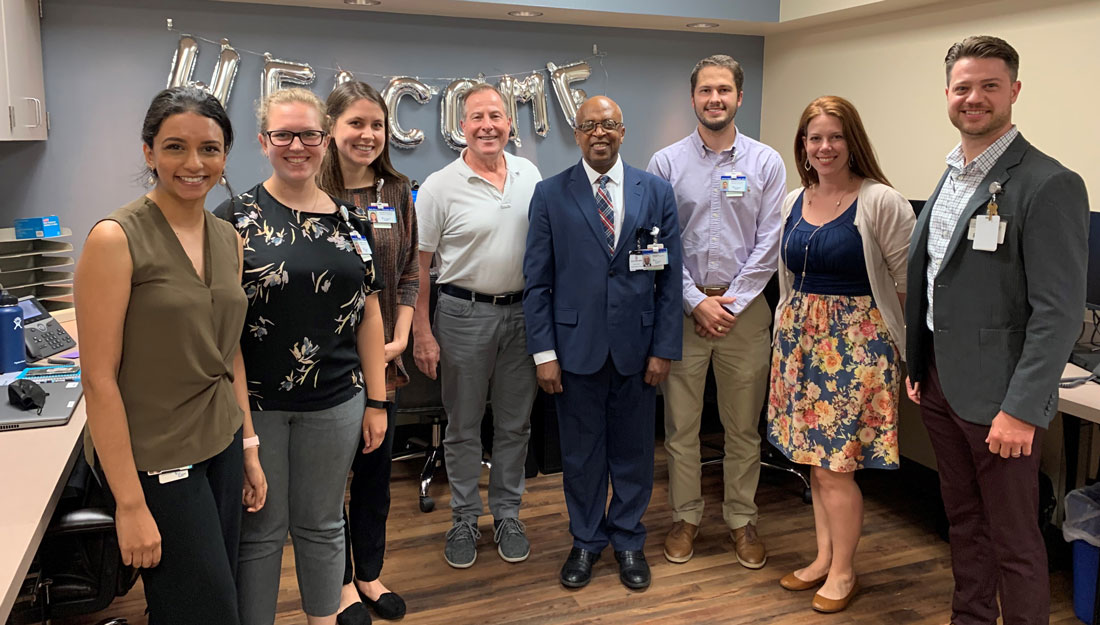Pharmacy residency program established at St. Joseph regional hospital

After 18 months of collaboration, the Texas A&M University Irma Lerma Rangel College of Pharmacy and St. Joseph Health have developed a new Pharmacy Residency Program at St. Joseph Regional Hospital in Bryan, Texas. The Postgraduate Year 1 (PGY1) Pharmacy Practice Residency program will promote clinical advancement of pharmacy practice and patient care.
“St. Joseph Health has always been focused on service to our community, and with the support of world-renowned educators and research leaders at Texas A&M University, we are able to combine our strengths to positively impact our community by providing world-class health care services,” said Jessica Jones, PharmD, clinical pharmacy manager and residency program director at St. Joseph Health.
The PGY1 pharmacy residency programs build on the Doctor of Pharmacy degree to further develop graduates into highly skilled clinical pharmacists responsible for medication-related care of patients with a wide range of conditions. These graduates are eligible for board certification and eligible for Postgraduate Year 2 (PGY2) pharmacy residency training.
“Pharmacy residents gain valuable experience by directly providing care to patients in a variety of settings. Pharmacy school graduates who participate in residency training gain a competitive advantage in the job market, as well as develop a wide network of professional contacts,” said George Udeani, PharmD, DSc, FCP, FCCP, head and clinical professor in the Department of Pharmacy Practice.
The PGY1 pharmacy residency program at St. Joseph Hospital has been awarded a candidate accreditation status by the American Society of Health-System Pharmacists (ASHP). The program currently offers three 12-month resident positions that provide training opportunities to strengthen skills in patient care; advancing pharmacy practice and improving patient outcomes; leadership and management; and teaching, education and dissemination of knowledge.
Core rotations include internal medicine, critical care, trauma/surgery, emergency medicine, infectious diseases, cardiac care and pharmacy administration.
“Having a residency program elevates the level of patient care throughout the hospital by expanding the pharmacy department’s ability to provide direct patient care services, expand educational programs and ensure continual innovative improvement through research,” Jones said.
The residency includes longitudinal experiences in medication safety, admission medication reconciliation, discharge transition of care, formulary management, practice leadership, and concentrated experiences in professional development and medical emergencies. Residents have the opportunity to engage in teaching and preceptorship of students during selected rotations and are required to complete an Academic Training Program.
“Texas A&M faculty will serve as program coordinators to continue the collaborative nature of the program between the hospital and college. In addition, clinical practice faculty who provide clinical services at the hospital will serve as preceptors to the residents the inaugural residents,” said Asim Abu-Baker, PharmD, associate dean for clinical and professional affairs at the College of Pharmacy.
The inaugural residency class includes Alison Stonecipher, PharmD, Brianne Braaten, PharmD, and Jacob Sellers, PharmD.
“Residency training is a vital component of our new strategic plan of the Rangel College of Pharmacy, and we are excited to partner with St. Joseph to train graduates to be exceptional clinical practitioners and leaders, meeting all requirements set forth by ASHP for first year residency programs,” said Indra Reddy, PhD, dean of the College of Pharmacy.
Media contact: media@tamu.edu


